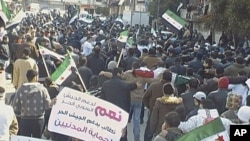Opponents of Syrian President Bashar al-Assad are asking international supporters to arm their uprising against Damascus. The Obama administration says that may not bring down the government in Damascus.
With Saudi Arabia and Qatar considering arming the uprising against Assad, Washington says it is not convinced that will end the conflict.
“It is not clear to us that arming people right now will either save lives or lead to the demise of the Assad regime," said U.S. Assistant Secretary of State for Near Eastern Affairs Jeff Feltman. "There are a lot of very complicated questions.”
Feltman told the Senate Foreign Relations committee this week that there is a robust conversation among international opponents of Assad about arming the uprising. At that hearing, Massachusetts Senator John Kerry said it is critical that Washington “proceed with extreme caution and with our eyes wide open” about supporting the rebel Free Syrian Army.
Feltman said a political solution remains a better, faster way to end the conflict.
“We have been very hesitant about pouring fuel onto a conflagration that Assad himself has set. So we are very cautious about this whole area of questioning. And that is why we have worked with this international consensus on political tracks, on economic tracks, on diplomatic tracks in order to get to the tipping point we are talking about,” said Feltman.
With Syrian forces using tanks and heavy artillery against government opponents, Feltman said it is not clear how more guns would help the uprising.
“I don't think when you hear the Saudis and Qataris talking about arming the opposition they are talking about somehow getting tanks into the opposition," said Feltman. "And how would the opposition know how to use them anyway?”
South Carolina Senator Lindsey Graham likened the Syrian conflict to NATO action in Libya, and asked the Obama administration to encourage Saudi Arabian efforts to supply and train Assad opponents.
With Iran defending Syria against what Tehran sees as a Sunni power grab, Middle East analyst Steve Heydemann said any overt Saudi military involvement would be just the sort of regional unraveling that the Obama administration is hoping to avoid.
“It is a risk that militarization of the Syrian uprising will also increase the sense of regional rivalry being played out on Syrian territory,” said Heydemann.
But Heydemann, who is a senior advisor for Middle East Initiatives at the United States Institute of Peace, said the militarization of the Syrian uprising is already underway.
“Weapons are flowing into Syria from a variety of different directions. They are moving to actors we know nothing about. Those flows are completely unregulated and uncontrolled, and the Free Syrian Army itself is a very loose coalition of militant groups who operate with very little, that has very little command and control,” said Heydemann.
Heydemann said more weapons could further fragment the Syrian opposition into independent militias that could threaten the establishment of a unified, stable, democratic, post-Assad Syria.
“We have some kind of an obligation to begin thinking about how to manage militarization so that as the armed resistance grows and develops, it does so in a coordinated fashion. It does so under the authority of the civilian opposition leadership. And it does so in a way that ensures that the governments which are supplying the equipment to the armed elements of the uprising are not doing it under the table,” said he said.
Heydemann said that would increase the legitimacy of Syrian civilian opponents and could, in doing so, contribute to a negotiated settlement.
| Join the conversation on our social journalism site - Middle East Voices. Follow our Middle East reports on Twitter and discuss them on our Facebook page. |




